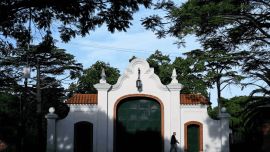President Alberto Fernández says he is confident that the government will seal a new financing programme with the International Monetary Fund that will not deliver new austerity measures for Argentina.
Speaking in the week a mission team of IMF officials arrived in Buenos Aires for talks, the Peronist leader put a positive spin on the negotiations with the Fund, which began in earnest this week.
"I am very confident that we are going to find a solution,” the president said Thursday. “We all understand the dimension of the problem but fundamentally we have the same desire for Argentina to fulfill its obligations.”
"We are working with the IMF at this time, with a technical group that has arrived [in Buenos Aires], and I am very confident that we will find a solution," said Fernández, addressing an online event organised by the US Chamber of Commerce and the AACCLA regional business association.
However, the Frente de Todos leader warned that any deal would not come at the cost of cutting help for “segments of his society that have already made immeasurable efforts."
The president’s comments were echoed by IMF Managing Director Kristalina Georgieva, who said austerity was not in anyone’s thoughts, especially given the challenges of the Covid-19 pandemic.
The IMF chief said the Fund has "no intention of putting pressure on Argentina at this time" in an interview with CNN's Spanish-language arm.
"We've come to Argentina above all to listen to the authorities, to listen to the Argentine people," said Georgieva, referring to the mission team headed by Fund officials Julie Kozack and Luis Cubeddu.
"We've made it very clear in this crisis that it's important to support businesses and, most importantly, workers. We are not coming with the idea of, ‘Oh, well, let’s see how we can further tighten up spending in these times,’” she told CNN en Español.
Fernández praised Georgieva’s leadership of the Fund on Thursday, highlighting the IMF’s “decisive” backing in the government’s successful restructuring of more than US$65 billion of debt held by foreign creditors back in August.
"The work she put in to understand our problem, accompanying us and advising us, I will always value, as well as the vision that she has of the world in these pandemic times," he said.
Repayments
Argentina wants to renegotiate its existing stand-by agreement worth US$57 billion, signed by the Mauricio Macri administration in 2018 amid a currency crisis. The government is seeking to reschedule payments which due to begin in September 2021 for the US$44 billion the country has received to date. Upon taking office, Fernández said he did not want to take the remaining funds. On Thursday, revisiting that time, he said that when he assumed the presidency, "Argentina was a patient in intensive care and while it was in intensive care, it caught the coronavirus."
Talks with IMF staff began in the capital on Tuesday, with Fund officials first meeting Economy Minister Martín Guzmán and Central Bank chief Miguel Pesce to discuss the foundations of a new financing programme. Kozak and Cubeddú also met with lawmakers, business leaders, NGO leaders and representatives from the Argentine Industrial Union while here, before departing on Friday. A second visit is scheduled for November, with talks expected to continue on into early 2021.
Despite the positivity radiating from officials on both sides of the talks, however, financial turbulence continues to rock the country. Uncertainty dominated the exchange markets this week, with the desire for greenbacks pushing the unofficial ‘blue’ dollar rate up to a record high, hitting 160 on Friday.
Analysts, meanwhile, are training their watchful eyes on the state of the Central Bank’s reserves, which have drained by more than US$10 billion over the past year. Gross reserves stand at around US$41 billion, though experts estimate net reserves are probably little more than US$5 billion.
In an address to the Senate this week, Cabinet Chief Santiago Cafiero confirmed the government would seek to postpone upcoming repayments, arguing Argentina had to return to growth in order to pay off its debt.
"The conversations have begun. If we want a country that will move towards a robust [economic] model, there is no room for the deadlines to which the previous government committed," Cafiero told the upper house.
"The IMF money, the Fund's US$44 billion, is no longer in the country," he added, implying it had departed through so-called "capital flight," a line repeated by a host of government officials this week, including the president.
‘Sustainable solution’
IMF officials are likely to ask the government to outline its economic plans during talks, which to date have been far from forthcoming.
"We'll see how the dialogue goes. We hope to be useful to Argentina to define medium-term growth objectives, to see what the obstacles to growth are and also so that the economy comes out of it strengthened and can respond to the expectations of the Argentine people," said Georgieva.
The challenges that lie ahead are great: Argentina’s economy, in recession since 2018, is scheduled to contract by more than 12 percent this year, while inflation is running at an annual rate of more than 40 percent. Unemployment is on the rise, currently at just over 13 percent, and poverty now affects 40.9 percent of the population.
Georgieva said the IMF wanted to part of a “sustainable solution” that went beyond the “cycles of advances and setbacks in Argentina” that had dominated for “such a long time”.
Asked whether the IMF was willing to lend again, the managing director said it was “a very early stage” of talks, though she added that “Argentina is a member of the IMF, and, like every member, we are there for you.”
The Alberto Fernández administration has given no indication that it will seek further funding from the IMF, which has a complicated and chequered history with Argentina.
Indeed, not everyone in the country welcomed the IMF’s arrival this week. As usual, news that the Fund was in town prompted street demonstrations and marches from left-wing groups, who asked the government to refuse to pay its debt in order to ensure working-class people do not have to suffer the reintroduction austerity measures.
Daniela Cohen, a leader with the Frente de Organizaciones en Lucha activist group that was among those demonstrating on Tuesday said that any IMF intervention was “illegitimate” and would imply “more austerity for working people.”
“The US$44 billion did not translate into benefits for the working class, nor for hospitals, nor schools nor houses, they went into the pockets of big businessmen, financial speculators and [government] officials,” she said.
– TIMES/AFP/AP


























Comments